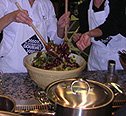A hands-on cooking class titled "Under the Tuscan Sun"—me? Sure, why not? I'd be fine. I wouldn't make a fool out of myself. Would I? Not if I could get my hands to loosen their tight grip on the steering wheel, thereby allowing me to get out of the Buick.
As I made my way through the double doors of The Everyday Gourmet at the corner of Pear Orchard and County Line Road, I took a deep breath. Inside I saw the other 11 students and the store's friendly staff. I knew that I'd be fine. Our hands would prepare delicious dishes under the tutelage of Elaine Trigiani, a Jacksonian who now lives in Loro Ciuffenna, Italy—in Tuscany, near Florence. Whether she's at home in Italy or back home in Mississippi, Trigiani spends her days teaching cooking classes and the importance of proper olive oil and fresh ingredients. One important thing she explains early on in her classes: Always re-cap olive oil as soon as you've poured out what you need so it won't lose its essence.
Our first instruction from Trigiani: Wash your hands often, before you begin and during the class. Then we divided into groups and started preparing Pappardelle with Ragu Veloce, Arista al Miele (Honey Roast Pork), Bietola Saltata (collards), Pear Pecan and Parmigiano Salad, and Crostata dell-Angiola (dessert).
Once the carrots and celery, fine chopped in a food processor, went into a deep pan along with the ground pork, the tomatoes, salt and Florenz Grappolini olive oil was stirred into the mixture. This particular olive oil is rich and tasty, a pure extra-virgin olive oil. We brought the mixture to a boil, then lowered the heat and let it simmer for an hour to an hour and a half, stirring occasionally; taking the lid off to do that released an enticing aroma. According to Trigiani's recipe, we added Res Porcini Mushroom Grappolini Olive Oil about 45 minutes into the cooking. Porcini is volatile and should not be used with high heat.
Italians eat a lot of salad. When possible, they go into their gardens and pick just what they need, or they head for the market to buy fresh from local farmers. Our salad was mixed together with a few tablespoons of olive oil and drizzled with balsamic vinegar. We topped it with shavings of Parmigiano Reggiano.
Later on you drain the collards, squeeze out excess liquid and chop roughly. Next, you sauté in olive oil seasoned with garlic and chili pepper and olive oil.
Although I didn't actually use my hands on the roast. I can tell you that the knife and fork worked just fine when it came time to dine on it. Tender, juicy, flavorful from the Florenz olive oil, honey and sage, the meat tasted perfect.
Pappardelle is wide-noodle pasta, made with eggs, hard wheat flour (finely ground semolina), soft wheat flour and a pinch of salt. Handmade pasta always soaks up some of the flavors of the sauce it's served with, but you still get to taste the pasta itself Trigiani said. All I can say is that if we'd only had the pasta dish to eat, I'd have been pleased beyond belief. The combination of tastes and textures transported me straight to Tuscany after my first bite.
The entire evening of hands-on cooking whirled by, a kaleidoscope of techniques, smells, textures and tastes. While we ate every morsel, Trigiani gave us the cook's tour of "Olive Oil Week in Tuscany," her latest venture in sharing the benefits of olive oil with everyone. The entire week, either in May or November, you stay in a small village built by the ancient Etruscans, with narrow stone alleys and busy piazzas. You'll take cooking classes, an olive oil seminar, a wine tasting class, go on food trips to a cheese maker, a pork butcher, and a bread baker. And you'll have free time to visit nearby Florence, Arezzo and Siena. You can get all the information you need to take yourself off to Tuscany at [e-mail missing]



Comments
Use the comment form below to begin a discussion about this content.